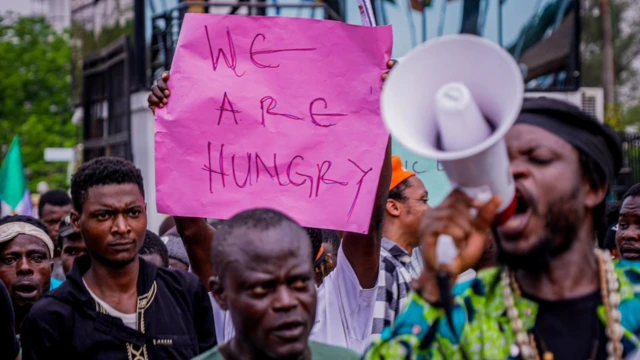It is often said that only when you accept that there is a problem can you begin to find a solution to it, and with the 1st of August drawing ever closer, Nigeria has many problems its leaders need to acknowledge, even if they act otherwise with the incoming nationwide protests.
As is typical of the average African politician or elite, as long as trouble does not appear on their doorstep, it is as good as saying there is no trouble, even if it bothers the next-door neighbor. This has grown into an ideology that Nigeria, and Nigerians specifically, have had to endure: suffering and smiling because a typical African man is used to the hardship and nothing but suffering.
Hence, even while the political elites dine in their mansions, allocate millions to sponsor their lavish lifestyles at the expense of the country’s economy, the masses are cajoled or petted to take things on the chin under the promise that things will get better. But will they? Or, succinctly put, do they?
Read More:
1st of August: Wike makes hasty moves to stall nationwide protests
1st of August: “I am scared, politicians are running” — VeryDarkMan
Throwback to when TB Joshua predict Nationwide protest
Nigeria, as its citizens have come to know it, has only worsened by the day and with every government that takes over. It started with the first coup in 1966, then the counter-coup, then the war, then the aftermath of the war, civil rule, the return to military rule, and then democracy. Since Nigeria’s independence, Nigerians have traded one enemy for another under the guise and faith that things would eventually get better.

If Nigerians are not allowed this chance to be heard, there stands a reasonable fear that anarchy may soon come for the once great nation…
But history has never been kind to Nigeria. History has shown us that promises and faith are worth nothing if the political elites continue to ignore the obvious and pretend there are no problems facing the country and its citizenry. While the upcoming nationwide protests on the 1st of August is seen by everyone in the current administration as a threat either to the power of the Federal Government or the image of the administration, the truth remains: things are not working in Nigeria.
It isn’t just that things are not working or the fact that the masses, year after year, season after season, era after era, are ignored that stands as Nigeria’s problem, but the reality that ‘Rule of Law’ and ‘Checks and Balances’ no longer hold any meaning in the real sense. The people no longer have a say as Nigeria’s leaders continue to dazzle in wealth and luxury in an obvious display of power and hypocrisy.
As far back as 2014, the country’s economy has been on a downward slope, with the administrations that have since come and gone doing nothing to address it. However, the masses are made to watch politicians spend millions to gather party tickets for the senatorial, gubernatorial, or presidential elections. Month after month, the news talks about billions being allocated for an alleged ‘cost of governance,’ which the citizens ironically do not see a benefit from.

Then, the government goes on to fight against the average masses’ only chance to be heard: protest. The nationwide protest on the 1st of August is suddenly seen as a threat, with politicians uniting front and center to stop civilians from taking to the streets to raise their voices and be heard.
The civilians are now treated as an anomaly or an aberration to democracy because they want to exercise their right to protest. But the real question the government or the political elites, who have become so steadfast in halting the nationwide protests on the 1st of August, should ask is: why would anyone want to shout if someone had already given them a listening ear? Why would the masses see no other option to dialogue with the government than to take to the streets en masse to challenge them if everything was alright?
A political system falls or is challenged when the people are not happy, and while the political elites are happy being bowed to and shown all the respect that their respective offices accord them, the reality still remains: they are there to serve the people, not the other way around.
This is why people want to protest, and all the more reason why instead of feeling threatened, the government and the political elites need to sit down and look at where Nigeria got it all wrong—the constitution.